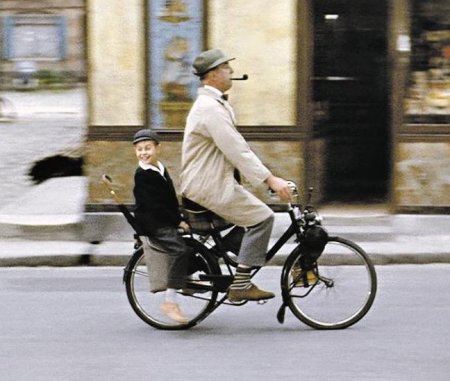Tati's My Uncle Makes Us Feel Better, in Any Language
By Steven Pate in Arts & Entertainment on Nov 2, 2012 6:25PM
 If there were a movie guru, sitting high atop a remote mountain of film canisters, VHS cassettes, DVDs and hard disks, issuing gnomic wisdom to the intrepid adventurers determined enough to reach him, we are pretty sure one of the great truths he would deliver would be: “Never pass up an opportunity to see a Jacques Tati movie.” Even if it didn't seem like the answer to whatever your question was, that would be sage advice indeed.
If there were a movie guru, sitting high atop a remote mountain of film canisters, VHS cassettes, DVDs and hard disks, issuing gnomic wisdom to the intrepid adventurers determined enough to reach him, we are pretty sure one of the great truths he would deliver would be: “Never pass up an opportunity to see a Jacques Tati movie.” Even if it didn't seem like the answer to whatever your question was, that would be sage advice indeed.
There is nothing in the history of cinema quite like the films of French comedian, war veteran, music hall entertainer, actor and director Jacques Tati. Tragically few in number, these gently comic explorations of simple but universally relatable scenarios are characterized by an ingenious and exquisite craftsmanship, and by an optimism about the human spirit. A bit like Wes Anderson, Tati’s films often feel like the work of a miniaturist, but the French icon was captivated more by societal issues than with personal or psychological ones. Tati builds train sets, Anderson dioramas.
Mostly, what we find is a good-natured ribbing of modern life accomplished by exaggerating how impersonal modern homes, modern workplaces, modern transportation can feel compared to the environments and ways of life whose pointy edges tradition has already rounded off. It's tempting to call Mon Oncle, the second of Tati's films showcasing the lanky, raincoatted Monsieur Hulot (played by the director himself) as he navigates through the the traditional world and the modern one armed only with his smoking pipe, The Artist of its day. Both won awards across the globe, including the Academy Awards, employing primarily the grammar of silent film.
But whereas The Artist achieved most of its mileage by winking at the wordless era, relishing our myths and stereotypes about the era as much as flattering us for celebrating its achievements, Mon Oncle simply does what the best silent films did: employ visually coherent storytelling techniques that were easily intelligible across cultures, and less reliant on dialogue and thus the hurdle of spoken language. Tati's world is so inventive and fun to look at all by itself that you remember how much of the fun of movies is simply the joy of looking. Matt Zoller Seitz once observed that Mon Oncle can be described as "Rear Window played for whimsy." It's no accident that both of those films are among the five that David Lynch chose as films that he loves: it is wholly original and very difficult to tire of watching.
While truly odd it is not entirely surprising that Tati attempted something that was done primarily during the very first years of sound filmmaking, shooting a different version in English while shooting the version in his native French. We haven't seen that English-language version, playing at the Siskel Film Center starting on Sunday, but Cine-File's Patrick Friel has, saying he was "hard-pressed to notice the differences." That's good news from an "if it ain't broke" perspective. This disarming tale has aged well, and watching the contrivances of technology and style which captivated us in the fifties is enjoyable not just for flattering ourselves by its quaintness but also for how relevant this humane critique of the foibles of civilization remains even today. If Tati were still around, it's a lead-pipe cinch that Hulot, adrift in a landscape of smart cars, smart phones, Starbucks and Segways, would have us chuckling and feeling better about things.
My Uncle (Mon Oncle) is playing in a newly-restored 35mm print at the Siskel Film Center on Sunday, Nov. 4 at 5 p.m. and Monday, Nov. 5 at 6 p.m.